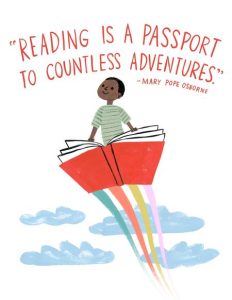Reading here at Morpeth All Saints…

Reading is implemented everywhere in our school. This is a skill we use every day across all subjects. We believe unless children can read, they cannot learn to the full. Reading Comprehension is taught through reading skills lessons, in addition to being an integral part of all writing teaching. Pupils read a range of fiction and non-fiction texts that are appropriate for their level of comprehension. Activities are planned to support understanding of the text and to develop pupils’ skills in decoding, predicting, questioning, clarifying, imagining and summarising. Children are encouraged to read their home/school reading books but also read books of their own choice from our school library to promote a love and pleasure for reading. We believe that a joint approach between school and home is optimal for cultivating both skills and passion for reading, and encourage pupils to take books home to read with family members.
Intent:
At Morpeth All Saints CE First School, we recognise the distinction between learning to read and reading to learn and understand the importance of structuring the teaching of reading appropriately through Early Years, Key Stage 1 to lower Key Stage 2.
Reading is a valuable, lifelong skill that intersects all areas of the curriculum. We develop our pupils through independent and shared reading as well as cross-curricular sessions which empower them to find pleasure in reading and actively promotes the acquisition of reading skills in all subjects. We aim to support all children to achieve their reading potential.
The overarching aim for English in the National Curriculum is to promote high standards of language and literacy by equipping pupils with a strong command of the spoken and written language, and to develop their love of literature through widespread reading for enjoyment.
(National Curriculum, DfE 2014)
Implementation:
Reading Scheme
We aim to provide a broad and balanced reading experience for the children throughout their time at Morpeth All Saints.
The school follows Little Wandle Letters and Sounds systematic synthetic phonics (SSP) programme to teach phonics and develop Early Reading. In Reception and Year 1 the children are heard to read three a week in Reading Practise groups linked to their phonic learning stage. The scheme uses phonetically decodable reading books pitched at a level the children are able to recognise the letters and blend them together to read words. The children also have access to a variety of other reading/picture books which ensures that all children have access to a wide range of books inclusive of fiction, non-fiction and poetry, and this book is a reading book for pleasure.
The children in Reception and Year 1 have their reading books selected for them by their teacher. Receiving two books a week, the children are given:
- A phonic based book that correlates to their current phonics teaching and learning following Little Wandle guidance and the book they have read in their reading practice session
- A reading for pleasure book either from Oxford Reading Tree or our school library.
From Year 2 onwards, or once the children have successfully completed Phase 5 phonics, the children are moved on to our reading scheme books mainly based on Oxford Reading books. Two books will continue to be sent home each week. Classes will have different arrangements for changing books which are shared with parents/carers. Reading diaries are used to record engagement in home reading and share children’s reading progress.
Teaching of reading during daily dedicated curriculum time
In Reception and Year 1 the children are heard read in groups three times a week using their Little Wandle reading books. These sessions are well planned and are designed to enable the children to become confident readers. The reading practice sessions focus on three key reading skills –
- Decoding
- Prosody – reading with meaning, stress and intonation
- Comprehension – understanding the text, using their skills of retrieval, inference, questioning, predicting and summarizing when reading.
Whilst groups are reading with the class teacher, other children will focus on reading skills which centre around VIPERS(Vocabulary, Interference, Prediction, Explanation, Retrieval and Summary).
From Year 2 onwards (if children have completed Phase 5), children have 30 minutes each day dedicated to the teaching of reading. Each day children will be involved in a different activity which will include the following…
- 1:1 Reading practice with a staff member (Each session will centre around on a different teaching and learning focus) (Once per week)
- Reading for pleasure accessing our high quality reading areas within the classrooms (Once per week)
- ReadingPlus Session (3 times per week)
- Reading Skills Activity focusing on VIPERS (Once per week)
Class Story Time
A key aim is to develop reading for pleasure and a passion for books here at Morpeth All Saints. To support this, each class has timetabled sessions for Class Story Time where as adult reads to the children and they get to sit back, relaxing and become completely immersed in the story!
Quality, progressive texts have been chosen for these sessions in the form of our Morpeth All Saints Reading Spine (further details below) ensuring that each class encounters a balance of different texts types in order to successfully navigate reading with confidence.
Wider Reading
We actively encourage children here at Morpeth All Saints to select their own books from the school library, bring books in from home, and welcome suggestions regarding the texts they would like to read in the future. We also encourage all parents and carers to read daily at home with their children which earn them bookworm points!
Impact:
As we believe that reading is key to all learning, the impact of our reading curriculum goes beyond the result of statutory assessments. Children have the opportunity to enter the wide and varied magical worlds that reading opens up to them. As they develop their own interest in books, a deep love of literature across a range of genres, cultures and styles is enhanced.
Through the teaching of systematic phonics and reading enquiry, our aim is for children to become fluent and confident readers who can apply their knowledge and experience to a range of texts.
In addition to this:
- Parents and carers will have a good understanding of how they can support reading at home, and contribute regularly to home-school records.
- The % of pupils working at age related expectations and above age related expectations within each year group will be at least in line with national averages and will match the ambitious targets of individual children.
- There will be no significant gaps in the progress of different groups of pupils (e.g. disadvantaged vs non-disadvantaged).

